英语造句的基本规则
- 格式:doc
- 大小:34.00 KB
- 文档页数:5
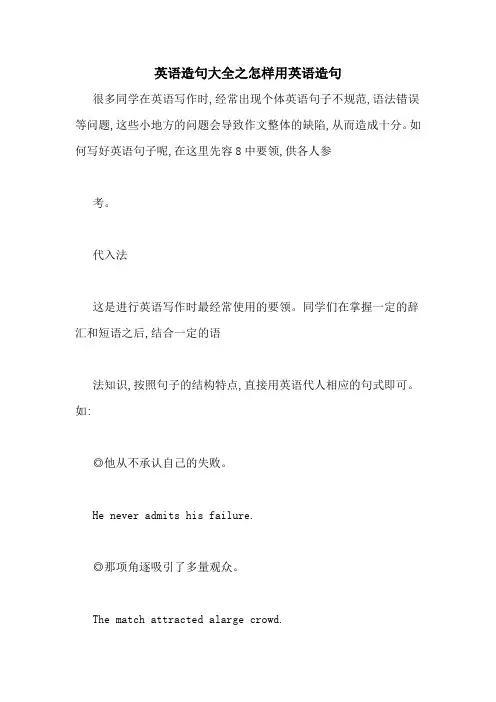
英语造句大全之怎样用英语造句很多同学在英语写作时,经常出现个体英语句子不规范,语法错误等问题,这些小地方的问题会导致作文整体的缺陷,从而造成十分。
如何写好英语句子呢,在这里先容8中要领,供各人参考。
代入法这是进行英语写作时最经常使用的要领。
同学们在掌握一定的辞汇和短语之后,结合一定的语法知识,按照句子的结构特点,直接用英语代人相应的句式即可。
如:◎他从不承认自己的失败。
He never admits his failure.◎那项角逐吸引了多量观众。
The match attracted alarge crowd.◎他把蛋糕分成4块。
He divided the cake into four pieces.还原法即把疑问句、强调句、倒装句等还原成基本结构。
这是避免写错句子的一种有效的措施。
如:◎这是开往格拉斯哥的火车吗?Is this the train for Glasgow?还原为陈述句his is the train for Glasgow.◎他是因为爱我的钱才同我结了婚。
It was because he loved my money that he married me.还原为非强调句:Because he loved my money,he married me.◎光速很快,我们几乎没法想像它的速度。
So fast does light travel that we can hardly imagine its speed.还原为正常语序ight travels so fast that we can hardly imagine its speed.分解法就是把一个句子分成两个或两个以上的句子。
这样既能把意思表达得更明了,又能减少写错句子的几率。
如:◎我们要干就要干好。
If we do athing,we should do it well.◎从各地来的学生中有许多是北方人。
There are students here from all over thecountry.Many of them are from the North.合并法就是把两个或两个以上的简单句用一个复合句或较复杂的简单句表达出来。
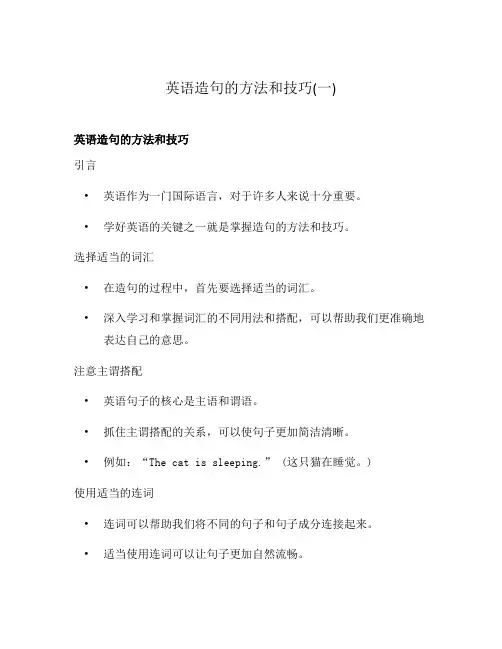
英语造句的方法和技巧(一)英语造句的方法和技巧引言•英语作为一门国际语言,对于许多人来说十分重要。
•学好英语的关键之一就是掌握造句的方法和技巧。
选择适当的词汇•在造句的过程中,首先要选择适当的词汇。
•深入学习和掌握词汇的不同用法和搭配,可以帮助我们更准确地表达自己的意思。
注意主谓搭配•英语句子的核心是主语和谓语。
•抓住主谓搭配的关系,可以使句子更加简洁清晰。
•例如:“The cat is sleeping.” (这只猫在睡觉。
)使用适当的连词•连词可以帮助我们将不同的句子和句子成分连接起来。
•适当使用连词可以让句子更加自然流畅。
•例如:“I like apples, but I don’t like bananas.” (我喜欢苹果,但不喜欢香蕉。
)采用并列结构•并列结构可以将两个或多个相同的句子或句子成分连接起来,起到平衡和强调的作用。
•例如:“She is not only a talented singer, but also a skilled dancer.” (她不仅是一位有才华的歌手,也是一位熟练的舞者。
)借助从句•从句是一个句子的一部分,它可以在句中充当名词、形容词或副词。
•运用从句可以丰富句子结构,增加句子的复杂性。
•例如:“I will go to the park after I finish my homework.” (我完成作业后我将去公园。
)采用强调手法•强调手法可以突出句子中的某个成分或信息,使其更加引人注意。
•如使用”do”强调动词,或使用”it is…that…“强调句子的某个部分。
•例如:“I do love playing the piano.” (我非常喜欢弹钢琴。
)•例如:“It is the book that changed my life.” (正是这本书改变了我的生活。
)总结•掌握英语造句的方法和技巧,可以使我们更加流利地表达自己的想法。
•选择适当的词汇,注意主谓搭配,使用适当的连词和并列结构,借助从句和强调手法,都是造句的重要技巧。

篇一:英语(yīnɡ yǔ)的造句方法英语(yīnɡ yǔ)的造句方法分解(fēnjiě)法:就是把一个句子分成两个(liǎnɡ ɡè)或以上的句子,这样既能把意思表达得更明了,又能减少写错句子的几率。
如:我们(wǒ men)要干就要干好。
IF WE DO ATHING,WE SHOULD DO IT WELL.从各地来的学生中有许多是北方人。
There are students here from all over the country 。
many of them are from the north。
合并法:就是把两个或以上饿简单句用以个复合句或较复杂的简单句表达出来。
這种要领最能表达学生的英语表达才能,同时也最能进步文章的可读性。
如:我们迷路了,這使我们的野营旅行量成一次冒险。
Our camping trip into an adventure when we got lost.天气转晴了,這是我们没有想到的。
THE WEATHER TURNED OUT TO BE VERY GOOD ,WHICH WAS MORE THAN WE COULDEXPECT.狼是高度群体化得动物,它们的成功依赖于合作。
Wolves are highly animals whose success depends upon their coopera-tion。
删减法:就是在写英语句子时,把相应汉语句子里的某些词。
短语或重复的成分删掉或省略。
如:这部打字机真是价廉物美。
注;汉语表达中的价和物在英语中均无需译出THIS TYPEWRITER IS VERY CHEAP AND FINE INDEED.个子不高不是人生中的严重缺陷。
注:汉语中说个子不高,其实就是不高。
也就是说其中的个子在英语中无需译出。
NOT BEING TALL IS NOT ASERIOUS DISADVANTAGE IN LIFE.移位法:由于英语和汉语在表达习惯上存在差异,根据表达得需要,某些成分要前置或后移。
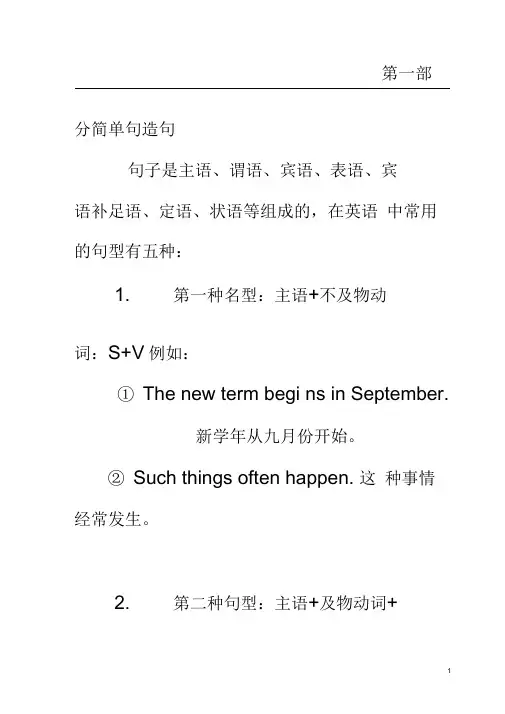
分简单句造句句子是主语、谓语、宾语、表语、宾语补足语、定语、状语等组成的,在英语中常用的句型有五种:1. 第一种名型:主语+不及物动词:S+V例如:① The new term begi ns in September.新学年从九月份开始。
② Such things often happen. 这种事情经常发生。
2. 第二种句型:主语+及物动词+宾语:S+V+O 例如:①We saw you just now. 刚才我们看见你了。
② I missed the train .我错过了火车。
(注意)常用跟单兵语的动词有:borrow, enjoy, forget, remember, guess, love, hate, post, supply, use 等。
例如:① He enjoys music. 他喜爱音乐。
② I forget my letter. 我忘记了我的信。
3. 第三种句型:主语+系动词+表语:S+V+P例如:① She always looks happy. 她看上去总是很快乐。
②The weather is cold here.这儿的气候很冷。
(注意)系动词是用来说明主语的状态、特征、变化过程的动词,常见的系动词可分为表状态的和表转变或结果的两类。
•表状态的连系动词:be, look,seem, smell, taste, sound, sit, sta nd,lie, keep, remain, stay 等。
•表转变或结果的连系动词:become,get, grow, turn, go, come, fall, prove等。
例如:① These cakes taste delicious. 这些蛋糕尝起来很好吃。
② Trees turn green in spring. 树在春天变绿。
4. 第四种句型:主语+及物动词+间接宾语+直接宾语:S+V+O (间接)+0 (直接)例如:① My mother bought a pen forme.我妈妈给我们买了一只钢笔。
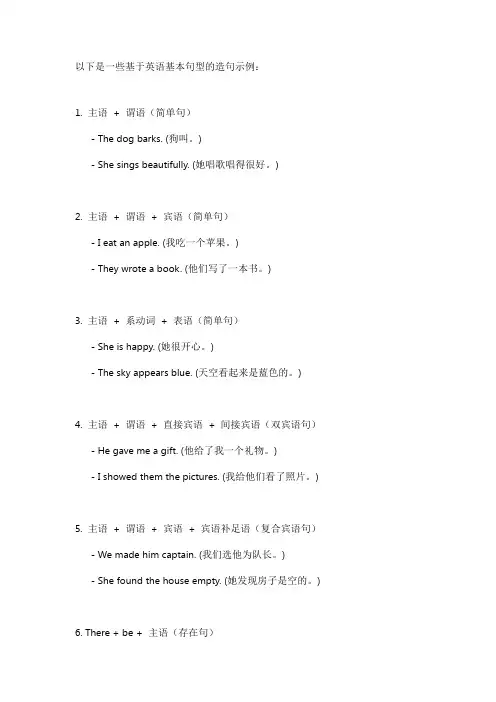
以下是一些基于英语基本句型的造句示例:1. 主语+ 谓语(简单句)- The dog barks. (狗叫。
)- She sings beautifully. (她唱歌唱得很好。
)2. 主语+ 谓语+ 宾语(简单句)- I eat an apple. (我吃一个苹果。
)- They wrote a book. (他们写了一本书。
)3. 主语+ 系动词+ 表语(简单句)- She is happy. (她很开心。
)- The sky appears blue. (天空看起来是蓝色的。
)4. 主语+ 谓语+ 直接宾语+ 间接宾语(双宾语句)- He gave me a gift. (他给了我一个礼物。
)- I showed them the pictures. (我给他们看了照片。
)5. 主语+ 谓语+ 宾语+ 宾语补足语(复合宾语句)- We made him captain. (我们选他为队长。
)- She found the house empty. (她发现房子是空的。
)6. There + be + 主语(存在句)- There are many stars in the sky. (天空中有许多星星。
)- There was a knock at the door. (有人敲门。
)7. 疑问词+ 谓语+ 主语(疑问句)- How many students are there in your class? (你们班有多少学生?) - What did you do yesterday? (你昨天做了什么?)8. 主语+ 谓语+ if/whether + 宾语从句(条件句或疑问句作宾语)- I wonder if it will rain tomorrow. (我想知道明天是否会下雨。
)- She asked whether we could help her. (她问我们是否能帮她。
)以上只是英语基本句型的一部分,实际语言使用中会有更多的变化和组合。

英语怎样造句子的方法公式阅读(2)英语写作的基本句式1.Declarative1.陈述句A declarative sentence "declares" or states a fact, arrangement or opinion. Declarative sentences can be either positive or negative. A declarative sentences ends with a period (.).陈述句是对事实、安排或观点进行“声明”或陈述。
陈述句可以是肯定句,也可以是否定句。
陈述句以句号(.)结尾。
I'll meet you at the train station.(我们在火车站见面吧。
)The sun rises in the East.(太阳从东方升起。
)He doesn't get up early.(他不早起。
)2.Imperative2.祈使句The imperative form instructs (or sometimes requests). The imperative takes no subject as 'you' is the implied subject. The imperative form ends with either a period (.) or an exclamation point (!).祈使句是发出命令(有时是要求)的一种句式。
祈使句中一般没有主语,you是隐含的主语。
祈使句以句号(.)或感叹号(!)结尾。
Open the door.(把门打开。
)Finish your homework.(把你的作业做完。
)Pick up that mess.(把这乱七八糟的收拾一下。
)3.Interrogative3.疑问句The interrogative asks a question. In the interrogative form the auxiliary verb precedes the subject which is then followed by the main verb (i.e., Are you coming ....?). The interrogative form ends with a question mark (?).疑问句就是提出问题的句式。
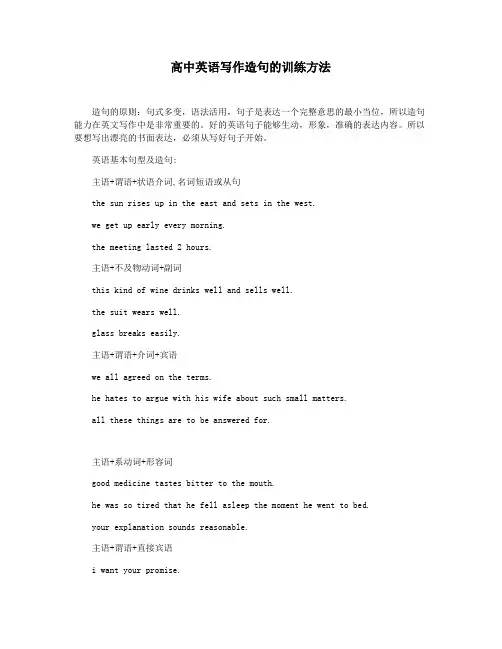
高中英语写作造句的训练方法造句的原则:句式多变,语法活用,句子是表达一个完整意思的最小当位,所以造句能力在英文写作中是非常重要的。
好的英语句子能够生动,形象,准确的表达内容。
所以要想写出漂亮的书面表达,必须从写好句子开始。
英语基本句型及造句:主语+谓语+状语介词,名词短语或从句the sun rises up in the east and sets in the west.we get up early every morning.the meeting lasted 2 hours.主语+不及物动词+副词this kind of wine drinks well and sells well.the suit wears well.glass breaks easily.主语+谓语+介词+宾语we all agreed on the terms.he hates to argue with his wife about such small matters.all these things are to be answered for.主语+系动词+形容词good medicine tastes bitter to the mouth.he was so tired that he fell asleep the moment he went to bed.your explanation sounds reasonable.主语+谓语+直接宾语i want your promise.have your fixed my watch?this factory produces 1000 cars a week.主语+谓语+间接宾语+直接宾语he paid me a visit yesterday.he owed me 50 yuan.he wrote his family a letter yesterday.主语+谓语+宾语+宾补 to doi will get someone to repair the recorder for you.i didn’t mean to hurt you.he invited me to teach at a well-known university.主语+谓语+宾语+宾补 doi often hear her sing the song.the boss made workers work 15 hours a day.don’t for get to have him come.主语+谓语+现在分词i heard her singing in the next room.we could feel our heats beating fast.did you observe the birds flying around the trees?主语+谓语+过去分词i must have my watch repaired.we must get he task finished on time.speak louder to make yourself understood by everybody.主语+谓语+宾语动名词i suggested putting off the meeting.they all avoided mentioning the matter.we can’t help laughing at the news.感谢您的阅读,祝您生活愉快。
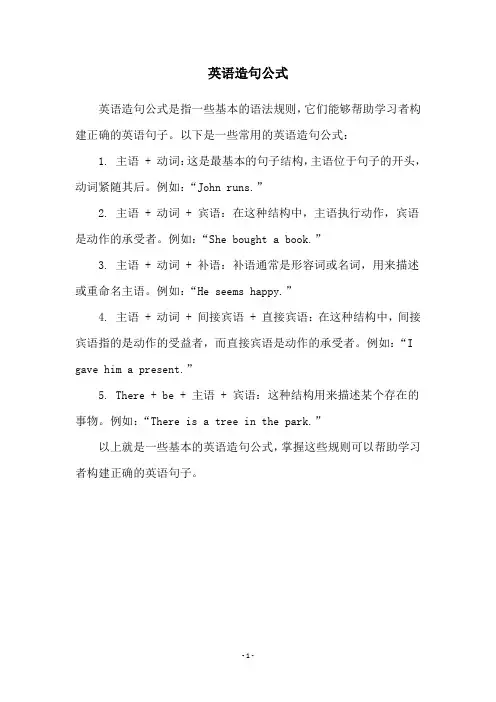
英语造句公式
英语造句公式是指一些基本的语法规则,它们能够帮助学习者构建正确的英语句子。
以下是一些常用的英语造句公式:
1. 主语 + 动词:这是最基本的句子结构,主语位于句子的开头,动词紧随其后。
例如:“John runs.”
2. 主语 + 动词 + 宾语:在这种结构中,主语执行动作,宾语是动作的承受者。
例如:“She bought a book.”
3. 主语 + 动词 + 补语:补语通常是形容词或名词,用来描述或重命名主语。
例如:“He seems happy.”
4. 主语 + 动词 + 间接宾语 + 直接宾语:在这种结构中,间接宾语指的是动作的受益者,而直接宾语是动作的承受者。
例如:“I gave him a present.”
5. There + be + 主语 + 宾语:这种结构用来描述某个存在的事物。
例如:“There is a tree in the park.”
以上就是一些基本的英语造句公式,掌握这些规则可以帮助学习者构建正确的英语句子。
- 1 -。
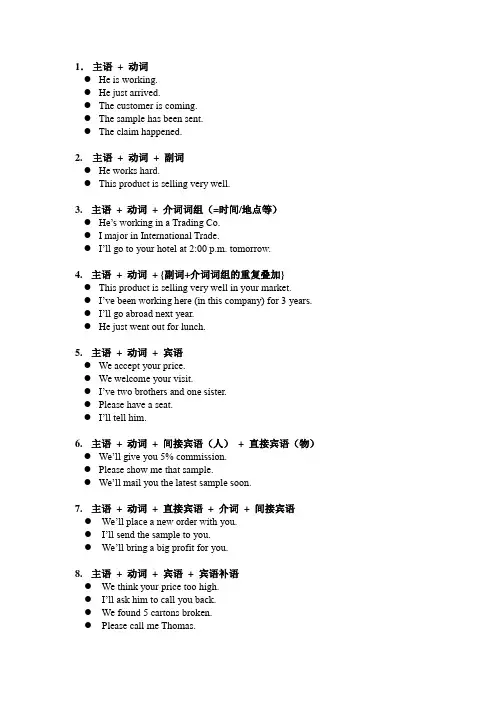
1.主语+ 动词●He is working.●He just arrived.●The customer is coming.●The sample has been sent.●The claim happened.2.主语+ 动词+ 副词●He works hard.●This product is selling very well.3.主语+ 动词+ 介词词组(=时间/地点等)●He’s working in a Trading Co.●I major in International Trade.●I’ll go to your hotel at 2:00 p.m. tomorrow.4.主语+ 动词+ {副词+介词词组的重复叠加}●This product is selling very well in your market.●I’ve been working here (in this company) for 3 years.●I’ll go abroad next year.●He just went out for lunch.5.主语+ 动词+ 宾语●We accept your price.●We welcome your visit.●I’ve two brothers and one sister.●Please have a seat.●I’ll tell him.6.主语+ 动词+ 间接宾语(人)+ 直接宾语(物)●We’ll give you 5% commission.●Please show me that sample.●We’ll mail you the latest sample soon.7.主语+ 动词+ 直接宾语+ 介词+ 间接宾语●We’ll place a new order with you.●I’ll send the sample to you.●We’ll bring a big profit for you.8.主语+ 动词+ 宾语+ 宾语补语●We think your price too high.●I’ll ask him to call you back.●We found 5 cartons broken.●Please call me Thomas.●Your visit made us happy.●Let me help you with your luggage.●The sunset made the sky red.9.主语+ 系动词+ 主语补语(形容词)●Our business is very good.●Your price seems workable.●The size is wrong.10.主语+ 系动词+ 主语补语(名词)●You are our new customer.●We are a manufacturer●Our minimum order quantity is 1000pcs.●Water became ice.11.There be + 主语(名词)+ 副词(地点/时间)●There are some defects in the sample.●There are two pictures on the wall.●There was a typhoon last week.●There will be some difficulties at the beginning of promotion.12.It be + 名词/副词/动词●It is Monday today.●It is on the table.●It is important.。
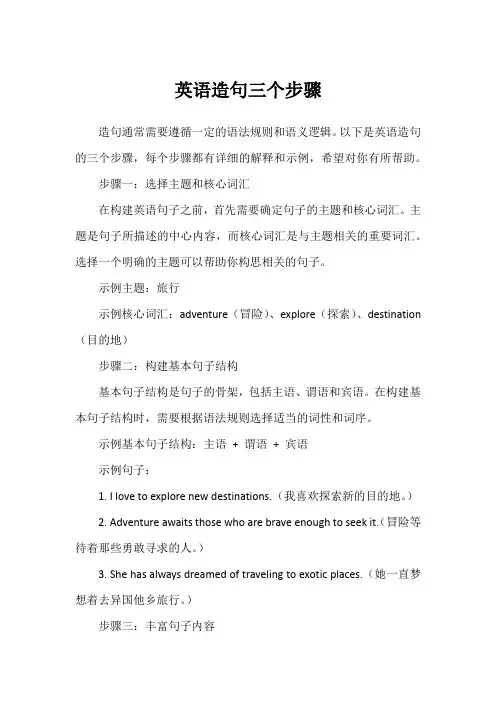
英语造句三个步骤造句通常需要遵循一定的语法规则和语义逻辑。
以下是英语造句的三个步骤,每个步骤都有详细的解释和示例,希望对你有所帮助。
步骤一:选择主题和核心词汇在构建英语句子之前,首先需要确定句子的主题和核心词汇。
主题是句子所描述的中心内容,而核心词汇是与主题相关的重要词汇。
选择一个明确的主题可以帮助你构思相关的句子。
示例主题:旅行示例核心词汇:adventure(冒险)、explore(探索)、destination (目的地)步骤二:构建基本句子结构基本句子结构是句子的骨架,包括主语、谓语和宾语。
在构建基本句子结构时,需要根据语法规则选择适当的词性和词序。
示例基本句子结构:主语+ 谓语+ 宾语示例句子:1. I love to explore new destinations.(我喜欢探索新的目的地。
)2. Adventure awaits those who are brave enough to seek it.(冒险等待着那些勇敢寻求的人。
)3. She has always dreamed of traveling to exotic places.(她一直梦想着去异国他乡旅行。
)步骤三:丰富句子内容在基本句子结构的基础上,可以通过添加修饰语、副词、形容词等来丰富句子内容,使其更加生动、具体和丰富。
示例修饰语:beautiful(美丽的)、exciting(令人兴奋的)、carefully (小心地)示例句子:1. I love to explore new and beautiful destinations that are off the beaten path.(我喜欢探索那些偏远而美丽的新目的地。
)2. Adventure awaits those who are brave enough to seek exciting challenges.(冒险等待着那些勇敢寻求令人兴奋的挑战的人。

用英语造句的基础:句子成分和简单句怎么用英语造句?英语的造句要从简单句开始。
简单句是最基本的英语句型,只有5种,所有的句子的主干都可以缩减为这5种。
第一句,砍掉修饰成分,business has settled. 主谓结构,第二句,本身就是简单句,主系表结构。
第三句,砍掉修饰成分,changes has been profound. 主系表结构。
所以,如果想学会用英语造句,简单句是绕不开的。
和简单句相比,什么时态、语态、语气的,都是细枝末节。
只有把主要框架搭对了,它们才能发挥作用。
简单句简单句有五种:至于例句,我编了个五句话的小故事。
1.I come. 我来了。
2.I love you. 我爱你。
3.I brought you a present. 我为你买了个礼物。
4.I want to make you happy. 我想让你幸福。
5.I am your boyfriend. 我是你的男朋友。
这五句话和上面说的简单句的种类是对应的。
看我标一下句子成分。
句子成分上面涉及到的句子成分有:主语:句子的主心骨,是句子就有主语,祈使句虽然形式上没主语,比如come here,我们都知道是让you come here。
谓语:为了便于理解,可以视为动词,表示动作的那种动词。
宾语:主语发出的动作的受者。
直接宾语和间接宾语,比如,我给你买了礼物,你是被给的,礼物是被买的,都是承受者。
礼物是直接承受者,是直接宾语,你是间接承受者,是间接宾语。
系动词:连接主语和表语的,be是最常用的系动词。
所以am, is, are, was, were, will be 都是系动词。
但是注意它们表示"是"的时候才是,如果是现在完成时里的is,比如He is working. 这里的is是构成时态的助动词,不是系动词。
构成被动语态的be也不是系动词。
表语:表达主语的成分。
I am a boy. I am handsome. 粗体部分,都是表语。
小学生英语造句教学方法(详情)小学生英语造句教学方法小学生英语造句教学方法:1.词句为本,注重积累。
词句的积累是形成语言技能的重要前提,是进行语言实践的必备手段。
英语学习的基础阶段是字词句的教学。
词句的教学要遵循记忆的基本规律,要分层次、分步骤,由易到难、由简到繁地进行。
首先是字,即识记单词,包括音标的认识、正确发音、词义的理解,这主要在低年级进行。
其次是词,即记忆单词,掌握单词的拼法和意义,这主要在中高年级进行。
最后是句,即能用学过的单词和句型造句。
2.注重交流,学以致用。
小学生的认知能力、应用能力相对较低,学习英语应该以兴趣为引导,让学生们感知到学习英语的乐趣。
3.规范书写,严抓习惯。
培养良好的书写习惯是英语起始教学的基础。
小学英语先进教学方法措施以下是小学英语先进教学方法措施的一些建议:1.游戏教学:将学习内容融入游戏中,让学生在玩中学,提高他们的学习兴趣和参与度。
2.情景教学:通过模拟真实场景,让学生在实际生活中使用英语,提高他们的语言技能。
3.合作学习:鼓励学生分组学习,通过交流和合作解决问题,培养他们的团队合作精神。
4.多媒体教学:利用多媒体资源,如视频、音乐、动画等,增强教学效果,提高学生的学习效果。
5.文化教学:融入跨文化元素,让学生了解西方文化,促进他们对英语的理解和应用。
6.教师引导:教师引导学生的学习进程,同时鼓励他们独立思考和创新思维。
7.及时反馈:及时对学生的表现进行反馈,肯定他们的进步,帮助他们纠正错误。
8.目标导向:设定明确的学习目标,让学生有明确的学习方向,激发他们的学习动力。
9.语言实践:提供语言实践的机会,如英语角、口语比赛等,让学生在实际场景中锻炼英语能力。
10.家长参与:与家长保持沟通,让他们了解孩子的学习进度和需求,共同促进孩子的学习。
这些方法可以根据具体情况进行灵活运用,以达到最佳的教学效果。
小学英语词汇教学方法小学英语词汇教学方法有很多种,以下是一些常用的方法:1.直观教学:利用实物、图片、动画等多媒体手段展示单词,让学生更好地理解单词的意义和用法。
英语造句的方法和技巧1. 了解语法规则:掌握句子的主谓宾结构、时态、语态等基本的语法规则,例如"The cat is sleeping."(这只猫正在睡觉。
)其中,“The cat”为主语,“is sleeping”为谓语。
2.积累词汇:扩充词汇量能帮助你更丰富地表达思想。
经常阅读英语文章、单词表和参考词典都可以提高词汇量。
3.模仿范例:学习和模仿经典句子,多读多写,加深对句子结构的理解。
例如,模仿经典句子“I have a dream.”(我有一个梦想。
)你可以改写成“I have a goal.”(我有一个目标。
)4.运用连词:学会使用连接词(例如and, but, because等)将句子连接起来,使句子更加连贯。
例如"He is smart and hardworking."(他既聪明又勤奋。
)5.多做练习:进行大量的写作练习,通过写作来训练你的句子构造能力。
可以从简单的句子开始,逐渐增加难度。
6.阅读和听力提高:通过阅读和听力练习,学习并模仿优秀的英语句子。
可以阅读各种英文书籍、文章、杂志,或者收听英语广播、音频等。
这样可以提高对英语句子结构和语言表达的理解。
7.追求简洁明了:在造句时,尽量避免使用繁琐的结构和过多的修饰语,力求用简单的词汇表达清晰的意思。
8.养成记录和总结的习惯:在写作或阅读中遇到好的句子,及时记录下来,方便日后进行总结和模仿使用。
总之,英语造句的方法和技巧包括掌握语法规则、积累词汇、模仿范例、运用连词、多做练习、提高阅读和听力水平、追求简洁明了,以及养成记录和总结的习惯。
通过不断地练习和积累,你可以逐渐提高英语造句的能力。
英语七个基本句型造句1“主语 + 谓语”(即“主谓”句型)这一句型英汉语言结构形式完全相同,说明“某人或某物如何动作”,或者说“某人或某物自身怎样运动”。
例:They arrived in Harbin yesterday morning.分析:“they”(主语)“arrived”(谓语)。
2“主语 + 谓语 + 宾语”(即“主谓宾”句型)这一句型英汉语言的结构形式完全相同,用以说明“某人或某物做什么事情”,或者说“某人或某物发出了动作,并且其动作涉及到另一个人或物”。
例:I study English.分析:“I”(主语)“study”(谓语动作)“English”(宾语即动作涉及的对象)。
3“主语 + 谓语 + 间接宾语 + 直接宾语”(即“主谓双宾”句型)这一句型英汉语序结构相同,说明“某人为谁(间接宾语为人)做某事”,或者说“某人或物的运动涉及到两个对象,其中一个间接对象为人,另一个为物”。
例:Our teacher taught us English.分析:“our teacher”(主语)“教”(谓语动作)“us”(间接宾语)“English”(直接宾语)。
4“主语 + 谓语 + 宾语 + 宾语补足语”(即“主谓宾补”句型)这一句型说明“某人或某物要求(使、让)某人做什么”或“某人感觉某人或物怎么样”。
例: He asked her to go there.分析:“he”(主语)“asked”(谓语动作)“her”(宾语即动作涉及的对象)“to go there”(补语—补充说明宾语做什么)。
5“主语 + 系动词+ 表语”(即“主系表”句型)这一句型用以说明“某人(某物、某事、某种概念)具有什么特征或处于什么状态”。
汉语的'“是”字结构属于这一英语句型的形式之一。
常用的联系动词有be, keep,lie, remain, stand, become, fall, get, go, grow, turn, look, feel, seem, smell, sound, taste, 等。
名词单复数变化规则造句英语
1. 一般情况下,在名词后面加s表示复数,例如:cups (杯子)。
2. 以s, x, ch, sh结尾的名词,加es表示复数,例如:boxes (盒子)。
3. 以o结尾的名词,前面加es表示复数,例如:potatoes (土豆)。
4. 以y结尾的名词,将y变为i,再加es表示复数,例如:butterflies (蝴蝶)。
5. 以f或fe结尾的名词,将f或fe变为v,再加es表示复数,例如:leaves (叶子)。
6. 有特殊变化的名词,例如:man (男人) - men (男人),woman (女人) - women (女人)。
7. 以辅音字母加y结尾的名词,变y为i,再加es表示复数,
例如:cities (城市)。
1. I have two cups on the table.
2. There are four boxes in the room.
3. We bought some potatoes from the market.
4. The garden is full of butterflies.
5. The tree in our yard is losing its leaves.
6. There are many men and women in the crowd.
7. The cities in this country are very crowded.。
英语造句的基本句型下面是店铺整理的英语造句的基本句型,欢迎大家阅读!英语造句的基本句型简单句是指由一个主语(或几个并列主语)和一个谓语(或几个并列谓语)构成的句子,不包含任何从句。
红色的为主语,蓝色的为谓语。
1、Welearn English.我们学习英语。
(一个主语和一个谓语)2、Both Xiao Zhang and Xiao liare from Sichuan.小张和小李都是四川人。
(一个并列主语和一个谓语)3、He once lived and worked here.他曾经在这里居住和工作过。
(一个主语和一个并列谓语)4、My father and mother go to work at eight in the morning and come back home at six in the evening.我父母早上8点上班,晚上6点回家。
(一个并列主语和一个并列谓语)分类一般来说,可以分为五类。
1、主语+不及物动词We work hard at Chinese.我们努力学习汉语。
She is singing in the room.她正在房间里唱歌。
2、主语+系动词+表语My mother is a doctor.我母亲是个医生。
Please keep quiet! 请安静!3、主语+及物动词+宾语My sisiter studies English.我的妹妹学习英语。
They have decided not to go to the party this evening.他们决定今晚不去参加聚会了。
4、主语+及物动词+间接宾语+直接宾语She bought me a dictionary.她给我买了一本字典。
I often teach her how to learn English.我经常教她学英语。
5、主语+及物动词+宾语+宾语补足语We elected him our school headmaster.我们选他当校长。
英语5大基本句型造句一、主语+系动词(be)+表语句型;二、主语+谓语动词(不及物动词);三、主语+动词(及物动词)+宾语;四、主语+谓语(及物动词)+间接宾语+直接宾语;五、主语+谓语+宾语+状语。
扩展资料第一种句型是:主语+系动词(be)+表语句型。
在这类句型中,谓语动词是系动词(be)的形式,主要有is、am、are、was、were。
比如:I am a student and very like English class.我是一个学生非常喜欢英语课。
He is the frist in my class.他是我们班第一名。
These apples are very fresh, you need eat it every day.这些苹果非常新鲜,你必须每天吃一个。
第二种句型是:主语+谓语动词(不及物动词)。
在这类句型中,谓语动词是不及物动词,这类动词后面是不可以接宾语的,但是可以接任意性状语。
所谓的.任意性状语是指去掉后,并不会影响句子完整的结构和意义。
比如:The orange was not to keep for a long time.橘子是不好长期保存的。
He had left here yesterday.他昨天已经离开了。
I can’t sleep in the night.我晚上失眠了。
第三种句型是:主语+动词(及物动词)+宾语。
在这类句型中,谓语动词是及物动词,而且是只接一个宾语的及物动词,这种动词我们经常称为单宾语及物动词。
比如:He had left my hom e yesterday , he can’t tell you.他昨天已经离开我家了,他没有告诉你。
She ate the dinner with her mother.她和她妈妈一起吃的晚饭。
I has left the Beijing by the train.我乘坐火车离开了北京。
第四种句型是:主语+谓语(及物动词)+间接宾语+直接宾语。
英语造句的基本规则英语造句的基本规则英语句子是由一组词按一定的语法规则组成并能够表达一个完整意思的语言单位。
其含义有三:1、一组词;2、符合语法规则;3、表达完整意思。
英语句子形状第一个字母大写,句末有标点符号(句号、问号或感叹号)。
所谓语法规则实际就是把合适的词放在句子中合适位置。
学习英语的最好办法就是多分析一些经典的句子,在此基础之上多读文章。
英语句子无论长短,其最基本的结构却不会变。
一个完事的英语句子至少要有“主语+谓语”两部分组成。
主语是句子的主体,表示所谈及的人或事物,主语通常由名词或起名词作用的词、短语或句子充当。
谓语由动词、动词短语组成。
句子的核心:主语(名词或相当的词、短语、句子)+谓语(动词或动词短语)在以后的分析中,我们把名词及名词相当的词标成绿色,而把它们的修饰部分标成紫色。
把动词标成红色,动词修饰部分标成桔黄色。
友情提示:学习初期,不要太拘泥于语法概念,只要你能够通过一些已经分析好的句子了解它要表达的意思就行了。
等你以后能够很轻松地读懂英语文章后,回头看这些语法概念就太简单了。
找出一个句子的名词及名词的修饰部分、动词和动词的修饰部分,你就能很轻松理解它。
例:孩子们把所有的饼干都吃了。
The children have eaten all the biscuits.孩子们已经吃了所有的饼干He work s very hard. 他工作非常努力。
他工作非常努力He must be our new teacher. 他肯定是我们的新老师。
他肯定是我们的新老师She can swim well. 她游泳很好。
宾语是动作的承受者,和主语一样由名词或相当的词、短语或句子承担。
The nurse often tells the children interesting stories. 阿姨常给孩子们讲一些有趣的故事。
阿姨经常告诉孩子们有趣的故事Light and sound travel in waves. 声和光都以波的形式传播。
声和光传播以波的形式He kept me waiting till twelve o’clock. 他让我一直等到12点。
他让我等待直到12点。
他让我等待。
这句话可以这样理解:他让我~,我等待。
这里的等待是宾语的行为,称为宾补。
Our intention is to learn from you.我的意图是向您学习。
我们的意图是向你学习The patient is out of danger. 病人没有危险。
病人(状况)没有危险英语中表述状况的句子用主系表结构。
注意其中的系动词,这是中国学生最容易丢掉的部分。
Your job is cleaning the room. 您的工作是打扫房间。
您的工作是打扫房间They promise to meet our needs . 他们许诺满足我们的需要。
他们许诺满足我们的需要He will come as soon as possible. 他会尽快过来。
他(会)来尽快地as soon as possible adv. 尽快地He came reluctantly.他勉强来了。
他来了勉强地He come from Chicago. 他来往芝加哥。
他来从芝加哥He goes to school at seven. 他7点上学。
他去学校(目标)在7点(时间)He came after finishing his homework. 他做完作业就过来了。
他过来了做完作业以后come 过来(现在式)came 过来了(过去式)He looked after me day and night. 他日夜照顾我。
他照顾我日夜He came only when he was in trouble. 只有遇到麻烦时他才来。
他来只有当他遇到麻烦的时候when 表示“当……的时候”He came smiling. 他微笑着走过来。
他走过来微笑的主谓一致的三大原则一、语法一致原则My other , as well as my father, has a key to the office. 我妈妈和我爸爸都有办公室的钥匙。
这里面的as well as my father 是一个插入语,主语依然是单数。
The performance of the first three clowns was very funny. 前三个小丑的表演非常滑稽。
这个句子的主语是performance。
The manager, along with his secretaries, is going to a dinner party tonigh.along with 以及有时候,主语和谓语之间插入性修饰短语,这时谓语只与主语保持一致。
主语是单数的谓语动词依然用单数。
The shortage of machines and skilled workers has caused the factory to get into difficulties.缺少机器和熟练工人使工厂陷入了困境。
The cptain, as well as the coaches, was disappointed in the team.队长以及教练(系)失望对这个队伍队长和教练都对该队很失望。
He rather than you is responsible for the accident.是他而不是你要对这次事故负责。
他胜于你(系)负责这对这次事故rather than conj. 胜于二、概念上一致原则Mathematics is his strong point. 数学是他的强项。
The Chinese are a hardworking race.中国人勤劳的民族。
All my family enjoy skating. 我们全家人都喜欢滑冰。
His family has moved into the new house.他家已经搬到新房子里住了。
The bread and butter is served for the breakfast. 早餐是黄油面包。
The singer and dancer is to attend our party. 那位歌唱家兼舞蹈将参加我们的晚会。
三、邻近一致原则谓语动词的数要与邻近的名词数保持一致。
He or I am in the wrong. 他或是我错了。
Neither you nor I am wrong. 你和我都没错了。
Tom or his sisters are coming. 汤姆或其姐姐要来。
The girls or their brother is coming . 女孩子们或其兄弟要来。
主谓一致中动词的三种具体情况A poor man is not necessarily unhappy. 穷人未必就不幸福。
The performance was very funny.表演非常滑稽。
Serving the people is my great happiness.为人民服务是我最大的快乐。
Watching TV is a pleasure. 看电视是一件乐事。
To eat three times a day is healthy.一日三餐有益健康。
To know something about English is one thing; to know English is quite another. 懂一点英语是回事,掌握英语完全是另一回事。
Whther or not they will come depends on the weather. 他们是否来取决于天气。
When he will come home is not known to us.他何时回家我们并不知道。
depend on v.依靠, 依赖Twenty miles is a long way to walk. 走20英里可是一段很长的路程。
Ten years has passed since we last met in Beijing.自从上次在北京见面到现在过去了10年。
Two hundred dollars is quite enough to pay for the old car. 200美元足以买下这辆汽车了。
The news is inspiring.这消息令人鼓舞。
Physics is one of the most difficult subject for me.物理对我来说是最难学的科目之一。
Politics is a complicated business.政治是复杂的事。
句子的时态变化英语中有些表示开始,或带有方向的动词在一般现在时可以表示将来.它们主要用来表示在时间已确定或安排好的事情.例如: begin, come, leave, start, arrive, return, stop, depart and go等.When does the train leave? 火车什么时候离开?The train leave at six tomorrow morning.火车明天早晨6点开车。
The plane takes off at 11 a.m.飞机今天上午11点起飞。
I see him tomorrom.我明天见他。
When does the bus start? It starts in ten minutes.I must finish this letter before I go home. 我必须在回家以前写完这封信。
I will wait here until the concert is over.Once he arrives we can start.I’ll write to you as soon as I arrive there. 我一到那里就给你写信。
Mother used not to be so forgetful. 妈妈过去并不是这样健忘。
She used to take a walk. 她过去常常散步。
I used to smoke a lot . 她过去抽烟很厉害。
I used to swim in a river when I was in my hometown.He is used to a vegetarian diet. 他习惯于吃素食。